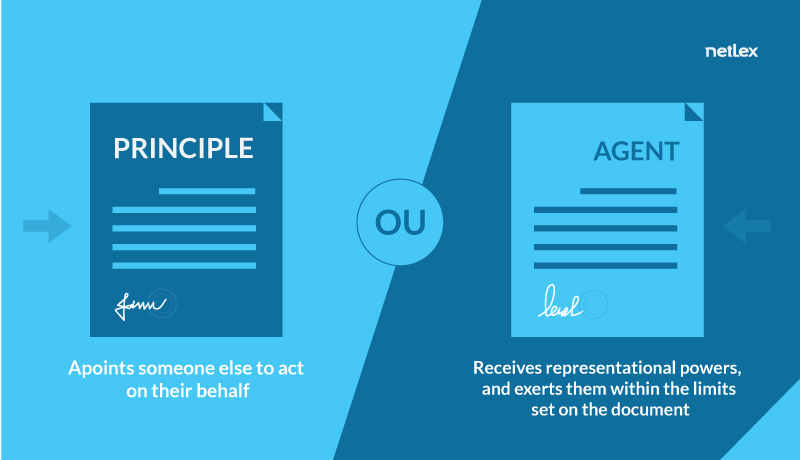A company is an abstract legal entity with no physical existence. Hence, it depends upon empowered individuals to represent it in any activity. The Power of Attorney - PoA is a legal document that confers to a person the authorization to act on behalf of another, and is regularly used by representatives of enterprises to negotiate and conclude business transactions, as well as to be represented in legal procedures.
A PoA involves two sides: the Principle, who grants the power of representation, and the Agent, who will exercise this power in accordance with the limits prescribed by the document.

As a rule, the Principle will be bound to fulfill the agreements entered into by the Agent. This is what ensures legal security to dealings conducted through representatives.
Relevant situations that affect the management of a PoA
As activities grow and diversify, more Agents are needed to conduct the business’ operations. The limits to their powers will vary in light of their area and position in the company, as well as considering the strategic nature of the dealings they are conducting.
The management of all PoAs issued by a company is an important task at the internal level. Here are a few relevant situations that may arise from this document’s lifecycle;
- An agent is no longer part of the enterprise, or was reallocated internally: in both cases, any powers they eventually had must be immediately revoked to reduce the risk of any unwanted dealings.
- An agent is on vacation, or takes a leave of absence: it is necessary to understand who has the power to replace that agent and under what circumstances.
- Periodic revision: as these documents usually have deadlines, periodically they must go through revision and signature all over again.
Some of these situations can be planned ahead, such as the periodic revision of all PoAs. However, others, such as a dismissal or leave of absence, can be abrupt and unforeseen. In these cases, the reaction must be immediate, to ensure all powers of representation are timely dealt with.
The importance of properly managing a company’s PoAs
The Power of Attorney must always be readily available and properly updated. It contains vital information to the conduction of business operations, both to the represented company and to the counterpart of the negotiations.
One key information is the extent of the powers conferred to the agent, as they might be limited in several dimensions. For example, they might have the power to negotiate, but not to close the deal. They might even be allowed to close it, but within a limited and pre-approved budget. These details must be updated and transparent to everyone involved in the transaction.
Moreover, important governance and compliance concerns surround a PoA, especially as there might be risks of misuse or fraud. An external audit, for example, will probably require information as to the number of PoAs issued, as well as to their expiration dates.
Hence, the management of the PoAs is an essential part of a company’s operation. netLex ensures these activities are met in a simple and secure manner, and allows for the gathering of important data regarding those documents.
Gathering data to improve management
In general, it is possible to have a 360º view of all PoAs in a company through data such as the total number of this kind of documents produced by area, or the number of active documents. This type of information is a good first step towards a more data driven management of PoAs.
In the pursuit of a more specialized data analysis, here are 3 types of data one can use to effectively manage a company’s Powers of Attorney.
Expiration Dates
As a rule, there is no time limitation to a Power of Attorney. However, it is considered best practice within a company to establish expiration dates to promote better control over the representation of the enterprise.
When the PoA reaches this mark, it is possible to renew it for another period of time or to formally revoke it. Renewal might be the most common situation, and it involves another round of approval and signatures that should be planned in advance to prevent unnecessary interruptions to the business flow. Moreover, if the PoA is not timely renewed, the validity of any dealings conducted by that Agent might be questioned in the future.
In that case, it is important to extract from a PoA these expiration dates and preferably set a warning to inform the persons in charge of the renewal procedures to begin preparations.
Within netLex it is possible to extract this information to improve the management of the company’s PoAs, as well as to set the expiration date warning. The renewal procedure can also be made more simple and secure with netLex, allowing for a fully automated drafting, reviewing and signing process.
Strategic Powers
Some Agents might hold powers considered strategic to the company, such as the authorization to conduct and conclude a key agreement, or to negotiate high-value contracts. These business transactions might draw the attention of the Board of Directors or even investors, and should be closely accompanied.
Another type of data that can be extracted from a PoA are precisely these authorizations considered strategic. It should be possible to accompany these documents, as well as to filter through all PoAs with the goal of visualizing the instances of strategic powers.
This sort of intelligence can be generated through metadata collected by netLex, and be easily visualized in an automatically updated dashboard.
Agent status
Companies are always hiring, relocating or firing employees, as well as changing management. Employees, on their turn, eventually will go on vacations or take a leave of absence. It is vital to keep track of all Powers of Attorney affected by these changes.
If, for example, an employee is relocated, the authorizations they once had need to be altered or revoked. A most pressing situation involves the collaborators who no longer work at the company. This scenery is not always foreseen or planned, yet all powers of representation they had must be revoked with expedience.
On the other hand, when an employee is only temporarily absent, it is also important to know who can replace them in the negotiations they are conducting. This will be defined based on, amongst other elements, who has similar representational powers in their PoA.
Hence, the status of an employee within a company is a relevant data to help manage a PoA. netLex can promote integrations with Human Resources Softwares, or even with a simple Excel sheet, and cross this information with the data extracted from the PoAs, to promote the effective management of all Powers of Attorney issued by the Company.
Change the management of your companies PoAs
A data-driven approach to business will ground important decisions in sound, updated information. In doing so, it will also promote good governance, ensuring transparency and compliance with the standards applicable. As an important document to the management of a company, Powers of Attorney must be included on that analysis.
With netLex it is possible to extract all the useful data from a PoA, while allowing for a fully automated creating, renewing, updating and revoking process. Click here to learn more about how we can help!






